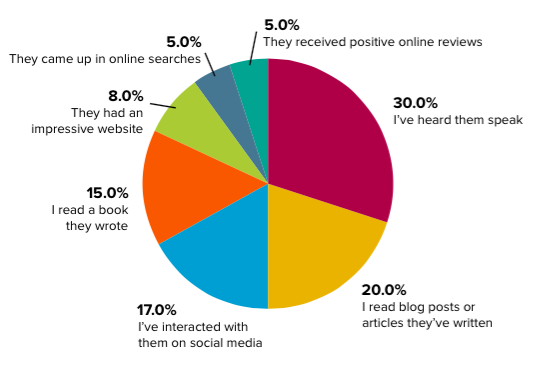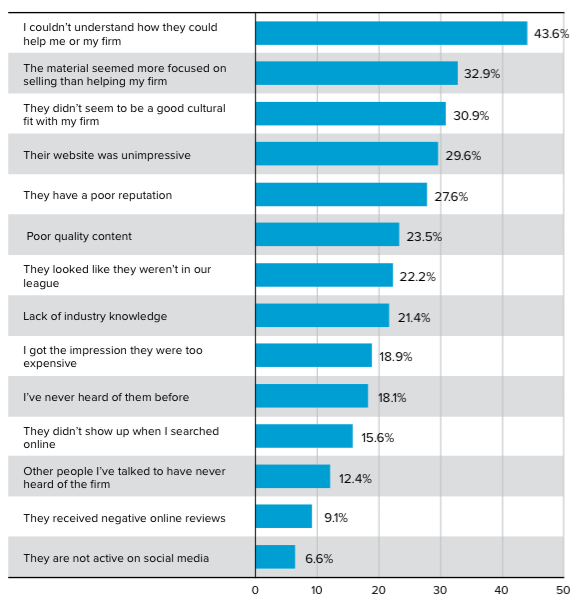The New World of Referral Marketing
The Growing Importance of Social Media and Marketing Expertise
Referrals are an old standard—perhaps the old standard—for growing your practice. For the better part of the last century, firms have worked under a simple assumption: do good work for your clients, network with referral sources such as attorneys and CPAs, and you will win new business through referrals. In this article, the author discusses the viability of this and emerging models.
 Referrals are an old standard—perhaps the old standard—for growing your practice.  For the better part of the last century, firms have worked under a simple assumption: do good work for your clients, network with referral sources such as attorneys and CPAs, and you will win new business through referrals.
Referrals are an old standard—perhaps the old standard—for growing your practice.  For the better part of the last century, firms have worked under a simple assumption: do good work for your clients, network with referral sources such as attorneys and CPAs, and you will win new business through referrals.
Today, many professionals still make this assumption.  For the most part, it holds true, but it’s no longer the whole story on referrals.  And more importantly, it’s not enough to remain competitive.
Groundbreaking research on referrals in the professional services marketplace shows that there’s a whole new world of referral opportunities to be leveraged today—and the firms that fail to capitalize on them will be left behind.
Referrals Aren’t Always Based on ExperienceÂ
The Hinge Research Institute studied 525 professional services firms to understand how referrals are generated today. Â The study asked respondents to identify referral sources as well as specify how they responded to referrals from others.
The results revealed a category of referrals that go virtually unnoticed and are often underutilized. Â These are referrals that are not based on direct experience working with you. Â These are not your clients. Â In addition, these are not the attorney, CPA, or investment banker who also worked on the engagement.
Importantly, 81.5% of professionals have received such referrals.  These referrals are typically based on your reputation for specific expertise—and they are surprisingly common.
Generating More Reputation Based ReferralsÂ
While professionals and experts can spend time and effort cultivating new contacts at networking events, it is unlikely to be worthwhile when it comes to actual referrals. Â In fact, only a little over 5% of non-client referrals come from such personal contacts.
Figure 1. Sources of Non-Client Referrals
The other 95% are based not on relationships, but on an informed understanding of the professional’s personal “expert brand”.  Fortunately, this branding is something that a smart marketing plan can dramatically increase.
So where exactly do expertise-based referrals come from?
Figure 2. Sources of Referrals Based on Expertise 
For firms that seek to build their reputation and audience awareness of their expertise, these are good places to start:
- Speaking engagements
- Blog posts and articles
- Social media engagement
By giving audiences opportunities to engage with one’s expertise in an in-depth way, one can build a powerful referral base that extends well beyond your direct clients.  But there is another critical component of a successful referral marketing plan: the professional has to capture the referrals you receive.
When Referrals FailÂ
For referrals to make an impact, they have to connect with the professional adviser.  Unfortunately, 51.9% of buyers will rule out a firm without even speaking to the person they were referred to, even if that firm’s professional(s) are just as or more competent than the firm that understands what factors influence decision makers.  Imagine the negative impact that could have on the growth of a practice!
Why then do potential clients rule out a firm or professional before speaking to them? Â This is where things get interesting.
Figure 3. Why Buyers Rule Out Referrals
There are many reasons with common threads running through them all: unclear services, a focus on selling rather than helping, a subpar website. Â In all of these top reasons for ruling out referrals, we see poor marketing and a failure to articulate expertise in a clear and relevant way.
The real good news is that the solution to “ruled-out referrals” can also help the professional or firm generate more new referrals.  By sharing one’s expertise widely and building one’s reputation through strategic marketing, firms can avoid being ruled out and encourage referrals from their target audiences.
Building a Better Marketing PlanÂ
It’s important to understand that all elements of a plan need to work together.  By providing clearer information on areas of expertise and services, one will be better equipped to leverage existing referral sources, get one’s foot in the proverbial “door”, and avoid being ruled out.  The service professional’s website, blog posts, speaking engagements, and social media activity should illustrate exactly what are the areas of expertise and better explain what exactly the service provider does, so one’s referral process can run smoothly.
Hinge Marketing is one source that focuses on branding and marketing for professional services providers. For more on today’s most successful referral marketing strategies, download our Rethinking Referral Marketing Executive Guide and Referral Marketing for Professional Services Firms research report.
If you are interested in generating and keeping more referrals by developing your own marketing program, explore how Hinge can help your firm through our special services designed just for NACVA Members.
Lee W. Frederiksen, PhD, is Managing Partner at Hinge, the leading branding and marketing firm for the professional services. Hinge conducts groundbreaking research into high growth firms and offers a complete suite of services for firms that want to become more visible and grow.
Mr. Frederiksen can be reached at: LFrederiksen@hingemarketing.com or (703) 391-8870.









